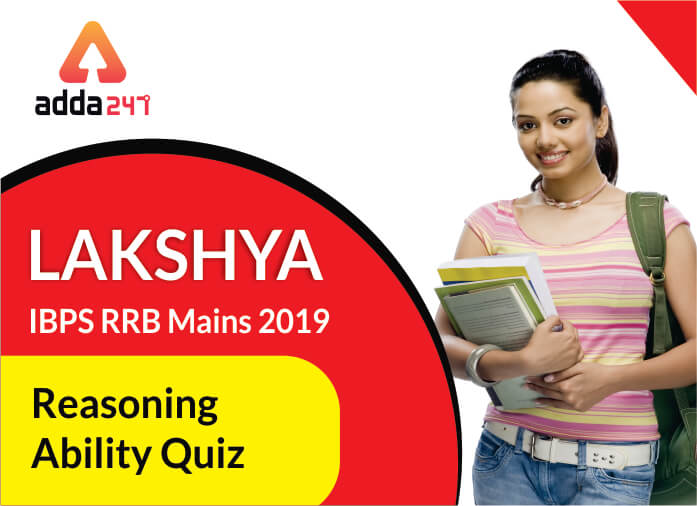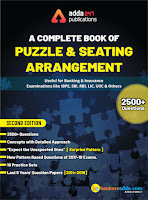IBPS RRB PO/Clerk Reasoning Quiz
The reasoning is an important part of a banking examination that holds the key for scoring well. This section tests the logic of a person while solving the questions. A good score depends on the clarity of your logical ability to crack the pattern of the question. This can only be attained if you practice daily without fail. For the IBPS RRB Mains 2019 Study Plan and also for the upcoming banking examinations including SBI Clerk, LIC ADO, IBPS PO, IBPS Clerk and all the others which are not yet officially announced like the RBI Grade B and the RBI Assistant 2019.
Here is IBPS RRB PO/Clerk Mains Reasoning quiz for 10th of September 2019 and it includes questions from Puzzle, miscellaneous.
Directions (1-5): Study the information carefully and answer the questions given below.
Seven persons J, K, L, M, N, O and P are sitting in a circular table. All of them like different fruits i.e. Apple, Guava, Mango, Orange, Litchi, Grapes and Papaya but not necessary in same order. Three of them face towards the center and rest of them face outside the center.
Only one person sits between P and the one who likes Litchi. M sits immediate right of the one who likes litchi. Two persons sit between the one who likes mango and the one who likes grapes. The one who likes grapes is neither immediate neighbor of M nor immediate neighbor of P. The one who likes apple is immediate right of P. M is not immediate neighbor of P. N sits third to the left of J, who likes guava. L sits second to the right of the one who likes orange. K sits immediate right to the one who likes Papaya. K does not like apple. M and L face opposite direction to each other. L does not face outside the center.
Q1. How many persons are sitting between K and O when counted from right of O?
(a) One
(b) Two
(c) Four
(d) Three
(e) None
Q2. Who among the following sits third to the right of the one who likes mango?
(a) O
(b) The one who likes Guava
(c) L
(d) The one who likes apple
(e) None of these
Q3. Who among the following sits second to the right of K?
(a) M
(b) The one who likes grapes
(c) the one who likes apple
(d) L
(e) None of these
Q4. Who among the following sits second to the right of J?
(a) O
(b) K
(c) N
(d) M
(e) None of these
Q5. If L and P interchange their positions, then who among the following sits immediate left of L?
(a) P
(b) N
(c) The one who likes orange
(d) The one who likes Guava
(e) None of these
Solutions (1-5):
S1.Ans(d)
S2.Ans(c)
S3.Ans(e)
S4.Ans(a)
S5.Ans(b)
Directions (6-8): Each question given below consists of a statement, followed by two arguments numbered I and II. You have to decide which of the arguments is a ‘strong’ argument and which is a ‘weak’ argument. Give answer as:
(a) if only argument I is strong
(b) if only argument II is strong
(c) if either I or II is strong
(d) if neither I nor II is strong
(e) if both I and II are strong
Q6. Statement: Should the tuition fees in all post-graduate courses be hiked considerably?
Arguments: I. Yes. This will bring in some sense of seriousness among the students and will improve the quality.
II. No. This will force the meritorious poor students to stay away from post-graduate courses.
S6. Ans.(b)
Sol. A hike in fees is no means to make the students more serious in studies. So, argument I is vague. However, with the increase in fees, poor meritorious students would not be able to afford post-graduate studies. So, argument II holds.
Q7. Statement: Should India create a huge oil reserve like some Western countries to face difficult situations in future?
Arguments: I. No. There is no need to block huge amount of foreign exchange and keep the money idle.
II. Yes. This will help India withstand shocks of sudden rise in oil prices due to unforeseen circumstances.
S7. Ans.(b)
Sol. Oil, being an essential commodity, our country must keep it in reserve. So, argument I is vague, while argument II holds as it provides a substantial reason for the same.
Q8. Statement: Should there be a cap on maximum number of contestants for parliamentary elections in any constituency?
Arguments: I. Yes. This will make the parliamentary elections more meaningful as the voters can make a considered judgment for casting their vote.
II. No. In a democracy any person fulfilling the eligibility criteria can contest parliamentary elections and there should be no restrictions.
S8. Ans.(e)
Sol. Clearly, if there were less candidates, the voters would find it easy to make a choice. So, argument I holds. Also, every person satisfying the conditions laid down by the Constitution must be given an opportunity and should not be denied the same just to cut down the number of candidates. So, argument II also holds strong.
Direction (9-11): Study the following information carefully and answer the given questions:
There are six members in a family sitting around a circular table. All of them face towards center. A sits 4th left to his grandson. C sits immediate right to his aunt. D sits immediate right to his father A. B is an unmarried female. E is daughter in law of the one who sits 3rd right to her. F has two children. C does not sit next to his mother. D is brother of B.
Q9. How many persons sit between A and his Daughter?
(a) none
(b)three
(c) two
(d) one
(e) none of these
Q10. How many females are there in the family?
(a) four
(b) one
(c) two
(d) three
(e) none of these
Q11. How is A related to F?
(a) husband
(b) son-in-law
(c) grand son
(d) son
(e) none of these
Solutions (9-11):
S9. Ans(c)
S10.Ans(d)
S11.Ans(a)
Direction (12-15): Study the following information carefully and answer the given questions:
Six persons sits around a triangular table such that three of them sit at the corners and the rest on the middle of the side. The one who sits at the corner face away from the center and the one who sit at the middle of the side face towards the center. They also like different games- golf, boxing, hockey, cricket, rugby and tennis. The one who likes golf sits at the corner. The one who likes tennis sits immediate right to the one who likes rugby. C sits second right to B, who likes hockey. D faces the center and sits third right to the one who likes cricket. E sits immediate right to D. F sits at one of the corners but does not like cricket and tennis. A is one of the persons. E does not like Rugby and Golf.
Q12. Who among the following likes rugby?
(a) E
(b) F
(c) C
(d) B
(e) none of these
Q13. Who among the following sits second to the right of the one who is third left of A?
(a) F
(b) E
(c) D
(d) B
(e) none of these
Q14. Who among the following likes cricket?
(a) A
(b) F
(c) C
(d) B
(e) None of these
Q15. Who among the following sits second to the left of the one who likes Golf?
(a) D
(b) A
(c) E
(d) F
(e) None of these
Solutions (12-15):
S12. Ans.(e)
S13. Ans.(d)
S14. Ans.(a)
S15. Ans.(c)
If you are preparing for Bank exams, then you can also check out a video for Reasoning below:






 The Hindu Review October 2022: Download ...
The Hindu Review October 2022: Download ...
 SIDBI Exam Analysis 2024 for Grade A and...
SIDBI Exam Analysis 2024 for Grade A and...
 Karnataka Bank PO Exam Analysis 2024, Di...
Karnataka Bank PO Exam Analysis 2024, Di...




